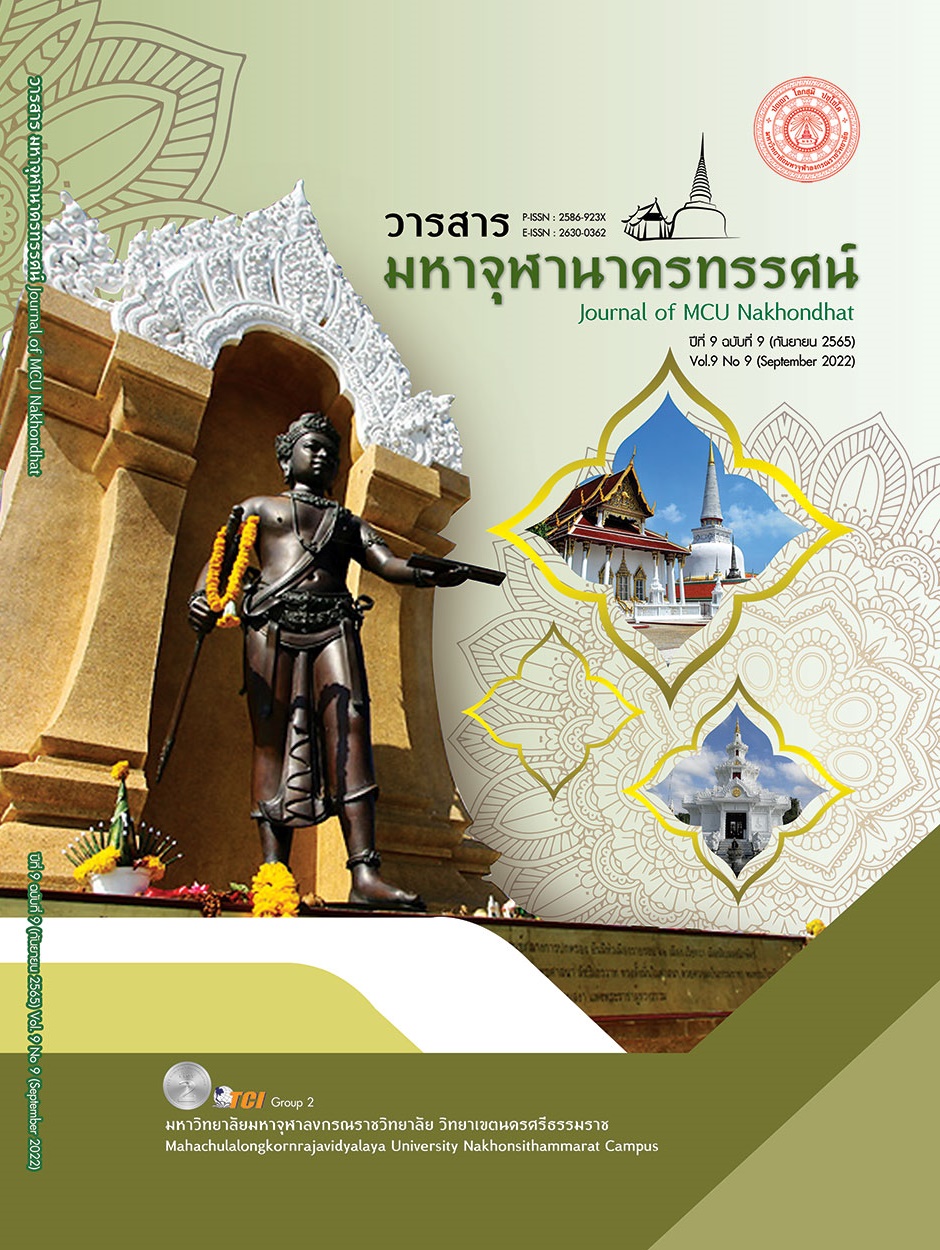THE ANALYZE THE THINKING OF ARTIFICIAL INTELLIGENCE (AI) AND HUMANS IN THE CONCEPT OF THERAVADA BUDDHIST PHILOSOPHY
Main Article Content
Abstract
This Academic article on "The Analyze the thinking of Artificial Intelligence (AI) and humans in the Concept of Theravada Buddhist philosophy" There are two objectives: 1. To know the thinking of artificial intelligence whether it can think like humans or not, and 2. To know the thinking of artificial intelligence will be harmful. Is it harmful to human society or not? By analyze method The Concept of Theravada Buddhist philosophy (Pancakkhandha: the Five Aggregates and Paticcasamuppada: the Dependent Origination; the Law of Causation). From the analysis, I found that the thinking of artificial intelligence Can't think like a human because the five aggregates are different both in quantity and quality In particular, artificial intelligence has no part in physical awakening and mental awakening. But artificial intelligence can think for itself, like every human being who thinks differently. If we do not define Thinking only arises from the mind (immaterial or Soul). But the Material can think for themself, such as the animal brains or the computer brains etc. As for the second objective, I found that in addition to artificial intelligence, there are many benefits. But it may be dangerous to humans. Depending are on how to create a preliminary program before thinking of further thinking, good or bad. It’s a good idea to create a preliminary program that is used to enter artificial intelligence. Thinking of further improvement or being able to think for themself is likely to be in a good way. But if creating an initial program that is used to feed into artificial intelligence. Is it a bad or evil idea? Artificial Intelligence's tendency to ideology is either negative or malicious. Which can lead to actions, they are harmful to human society.
Article Details

This work is licensed under a Creative Commons Attribution-NonCommercial-NoDerivatives 4.0 International License.
References
คณาจารย์มหาวิทยาลัยมหาจุฬาลงกรณราชวิทยาลัย. (2563). ปรัชญาเบื้องต้น. กรุงเทพมหานคร : มหาวิทยาลัยมหาจุฬาลงกรณราชวิทยาลัย.
ผู้จัดการออนไลน์. (2562). “3 มุมมอง AI จาก Jack Ma และ Elon Musk ฉบับชาวบ้าน” ข่าว ไอที. เรียกใช้เมื่อ 21 มิถุนายน 2565 จาก https://mgronline.com/cyberbiz /detail/9620000083983
พระครูปลัดสุวัฒนพุทธคุณ (ประมวล พานิช) และคณะ. (2562). พุทธจริยศาสตร์เพื่อความสุข ในสังคม. วารสารบัณฑิตศึกษามหาจุฬาขอนแก่น, 6(2), 1-13.
พระครูวินัยธรอำนาจ พลปญฺโญ และคณะ. (2560). พุทธจริยศาสตร์กับการพัฒนาการศึกษา เรื่องความจริงความรู้ ความดี. วารสารสันติศึกษาปริทรรศน์ มจร, 5(1), 332-342.
มหาจุฬาลงกรณราชวิทยาลัย. (2539). พระไตรปิฎกภาษาไทย ฉบับมหาจุฬาลงกรณราช วิทยาลัย (เล่ม 16).(โปรแกรมพระไตรปิฎกภาษาไทย ฉบับมหาจุฬาลงกรณราช วิทยาลัย). เรียกใช้เมื่อ 20 กรกฎาคม 2565 จาก http://www.geocities. ws/tmchote/tpd-mcu/tpd16.htm
ลอย ชุนพงษ์ทอง. (2564). ชุดพุทธธรรม(Clips VDO EP.12-14) ใน Academy/playlist. เรียกใช้เมื่อ 20 ธันวาคม 2564 จาก https://www.youtube.com/c/Loy
สนิท ศรึสำแดง. (2548). ปรัชญาเถรวาท, (พิมพ์ครั้งที่ 2). กรุงเทพมหานคร: จรัลสนิทวงศ์การ พิมพ์.
สมเด็จพระพุทธโฆษาจารย์ (ป.อ. ปยุตฺโต). (2562). พุทธธรรม ฉบับปรับขยาย. (พิมพ์ครั้งที่ 22 ฉบับข้อมูลคอมพิวเตอร์). เรียกใช้เมื่อ 20 ธันวาคม 2564 จาก https://www. watnyanaves.net/uploads/File/books/pdf/buddhadhamma_extended_e dition.pdf
สมภาร พรมทา. (2561). “คำบรรยายวิชาปรัชญาปรากฎการณ์วิทยาและอัตถิภาวนิยม ตอนที่ แปด: Existentialism ของ Heidegger” ในศูนย์ศึกษาพุทธปรัชญา มหาวิทยาลัยมหา จุฬาลงกรณราช-วิทยาลัย. เรียกใช้เมื่อ 14 ตุลาคม 2562 จาก http:// csbp.mcu.ac.th/
Abdulthaitube. (2017). 10 อันดับหุ่นยนต์และปัญญาประดิษฐ์ AI ที่เป็นภัยคุกคามต่อมนุษย์ (Clip V.D.O.). เรียกใช้เมื่อ 18 ตุลาคม 2562 จาก https://www. youtube.com/watch?v=e4qKigFgwXI
Karoonp. chetpayark. (2017). “ศึกหยุดโลก เมื่อเหล่าผู้เชี่ยวชาญเห็นต่างเรื่อง AI”. บทความออนไลน์. เรียกใช้เมื่อ 21 มิถุนายน 2565 จาก https://thematter.co /science-tech/ai-opinion-war/30774


